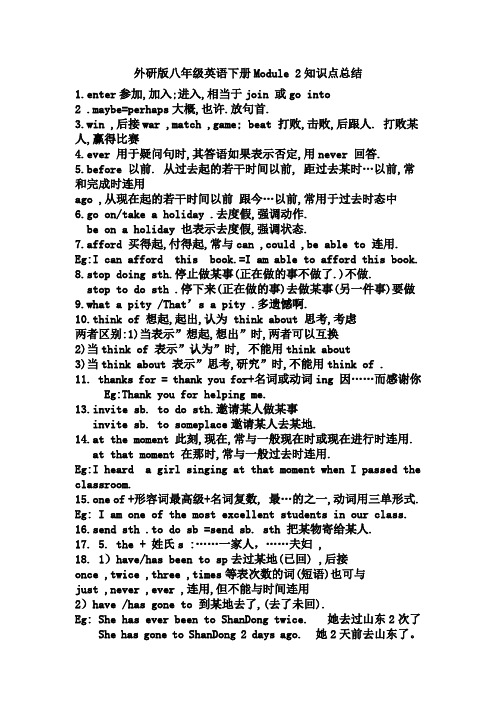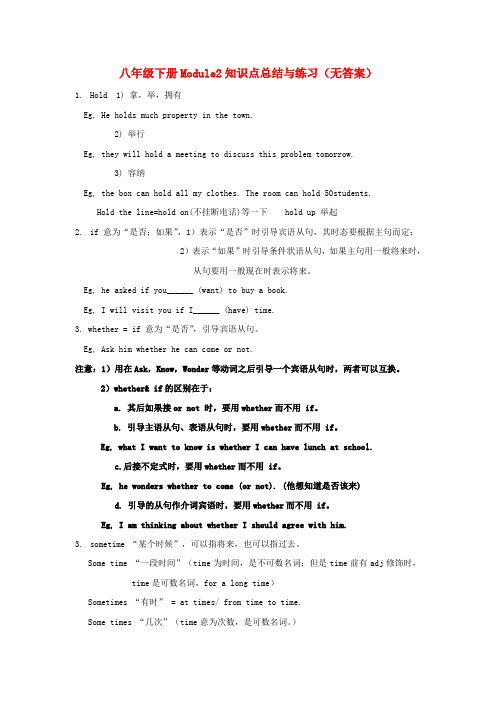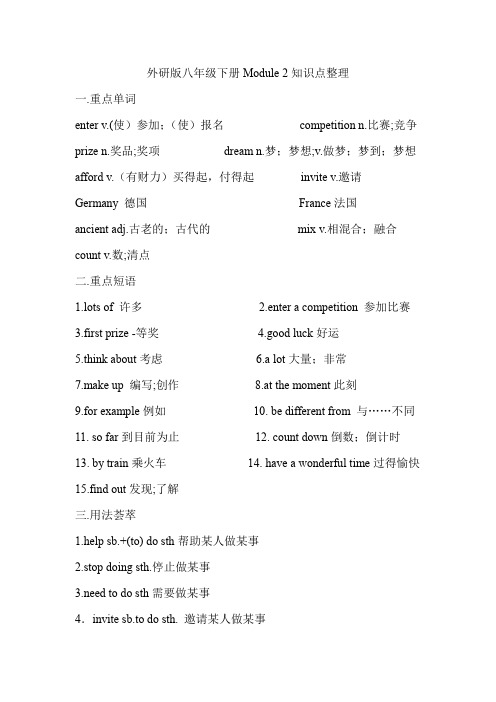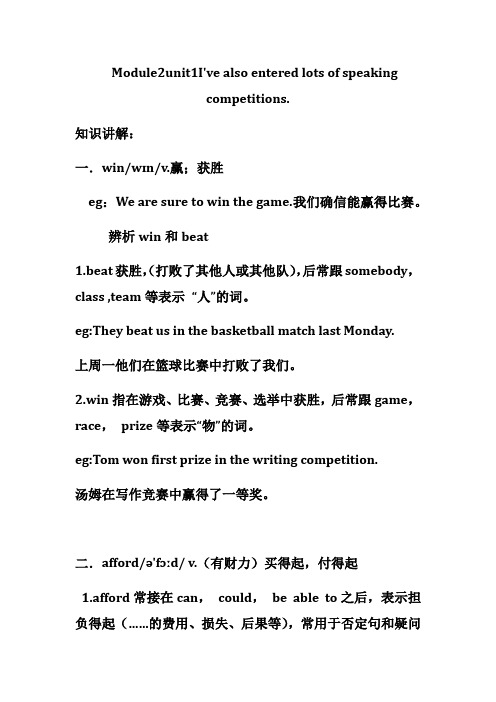八年级英语下册 Module 2 知识点总结与练习无答案 外研版
Module 2课文知识点总结(含语法)-外研版八年级下册英语

2021~2022学年新课标外研版初中英语学习讲义八年级下学期Module 2课文知识点总结笔记Module 2 Experiences语法: 现在完成时(一)一、用法:(1)表示以前某个时间已经发生的动作或做过的事情对现在有影响 Eg: I have seen the film. 我已经看过这部电影了。
(强调电影的内容已经知道)(2)表示到目前为止已经完成的事。
Eg: My sister has learnt English for 3 years. 我的妹妹已经学英语三年了。
二、构成:主语 + have/ has + 动词过去分词三、各种句式肯定句:主语 + have/ has + 过去分词 + 其它Eg: I have watched the match.否定句:主语 + have/ has not + 过去分词 + 其它Eg: I haven’t watched the match.一般疑问句:Have/ Has + 主语 + 过去分词 + 其它肯定回答: Yes, 主语 + have/ has.否定回答: No, 主语 + haven’t/ hasn’t.Eg: Have you watched the match ?Yes, I have./ No, I haven’t.四、动词过去分词的构成:规则动词变化1.大多数动词后直接加ed:work → worked; cook → cooked2.以e结尾的动词加d:lived → lived; like→ liked3.以辅音加y结尾将y变成i加ed:try → tried; study → studied4.在重读闭音节中,双写结尾加ed: stop → stopped; plan → planned5.不规则变化:见教材126页表格1.experience ( Cn.) 经历Eg: Please tell me about your experience in Africa.experience (Un) 经验Eg: Miss Li has 30 years’ teaching exper ience.2.enter a competition 参加比赛enter = take part in 参加;进入3.what kind of …什么种类kind (n.) 种类 all kinds of 各种各样的; a kind of 一种; different kinds of 不同种类的;kind of 有点;kind (adj.) 善良的 Eg: He is a kind boy.4.speaking competition 演讲比赛5.improve speaking 提高口语6.maybe (adv.) “也许;大概”may be 情态动词 + Be动词“也许是;可能是”Eg: She may be angry.= Maybe she is angry.7.win a prize 获奖beat “打败”后接对手或团队等win “赢得”后接比赛、奖品等8.the first prize 一等奖9.dream (n.) 梦寐以求的人或事Eg: That’s my dream s chool.dream “梦;梦想”Eg: My dream is to be a pilot.(v.) 梦到;梦想dream of/ about …“梦见… ”后接名词、代词或动名词Eg: I dream of/ about flying in space.10.ever (adv.) “曾经;从未”用于现在完成时的一般疑问句中,加强语气“Have/ Has sb. ever + 过去分词 + 其它?”用于询问某人是否做过某事11.before(adv.) “以前”与现在完成时连用,也可用于一般过去时中,位于句末。
外研版八年级英语下册Module 2知识点总结

外研版八年级英语下册Module 2知识点总结1.enter参加,加入;进入,相当于join 或go into2 .maybe=perhaps大概,也许.放句首.3.win ,后接war ,match ,game; beat 打败,击败,后跟人. 打败某人,赢得比赛4.ever 用于疑问句时,其答语如果表示否定,用never 回答.5.before 以前. 从过去起的若干时间以前, 距过去某时…以前,常和完成时连用ago ,从现在起的若干时间以前跟今…以前,常用于过去时态中6.go on/take a holiday .去度假,强调动作.be on a holiday 也表示去度假,强调状态.7.afford 买得起,付得起,常与can ,could ,be able to 连用. Eg:I can afford this book.=I am able to afford this book.8.stop doing sth.停止做某事(正在做的事不做了.)不做.stop to do sth .停下来(正在做的事)去做某事(另一件事)要做9.what a pity /That’s a pity .多遗憾啊.10.think of 想起,起出,认为 think about 思考,考虑两者区别:1)当表示”想起,想出”时,两者可以互换2)当think of 表示”认为”时, 不能用think about3)当think about 表示”思考,研究”时,不能用think of .11. thanks for = thank you for+名词或动词ing 因……而感谢你 Eg:Thank you for helping me.13.invite sb. to do sth.邀请某人做某事invite sb. to someplace邀请某人去某地.14.at the moment 此刻,现在,常与一般现在时或现在进行时连用. at that moment 在那时,常与一般过去时连用.Eg:I heard a girl singing at that moment when I passed the classroom.15.one of +形容词最高级+名词复数, 最…的之一,动词用三单形式. Eg: I am one of the most excellent students in our class.16.send sth .to do sb =send sb. sth 把某物寄给某人.17. 5. the + 姓氏s :……一家人,……夫妇 ,18. 1)have/has been to sp去过某地(已回) ,后接once ,twice ,three ,times等表次数的词(短语)也可与just ,never ,ever ,连用,但不能与时间连用2)have /has gone to 到某地去了,(去了未回).Eg: She has ever been to ShanDong twice. 她去过山东2次了 She has gone to ShanDong 2 days ago. 她2天前去山东了。
八年级英语下册 module2知识点总结与练习(无答案) 外研版

八年级下册Module2知识点总结与练习(无答案)1.Hold 1) 拿,举,拥有Eg, He holds much property in the town.2) 举行Eg, they will hold a meeting to discuss this problem tomorrow.3) 容纳Eg, the box can hold all my clothes. The room can hold 50students.Hold the line=hold on(不挂断电话)等一下 hold up 举起2.if 意为“是否;如果”,1)表示“是否”时引导宾语从句,其时态要根据主句而定; 2)表示“如果”时引导条件状语从句,如果主句用一般将来时,从句要用一般现在时表示将来。
Eg, he asked if you______ (want) to buy a book.Eg, I will visit you if I______ (have) time.3. whether = if 意为“是否”,引导宾语从句。
Eg, Ask him whether he can come or not.注意:1)用在Ask,Know,Wonder等动词之后引导一个宾语从句时,两者可以互换。
2)whether& if的区别在于:a. 其后如果接or not 时,要用whether而不用 if。
b. 引导主语从句、表语从句时,要用whether而不用 if。
Eg, what I want to know is whether I can have lunch at school.c.后接不定式时,要用whether而不用 if。
Eg, he wonders whether to come (or not). (他想知道是否该来)d. 引导的从句作介词宾语时,要用whether而不用 if。
Eg, I am thinking about whether I should agree with him.3.sometime “某个时候”,可以指将来,也可以指过去。
外研版八年级英语下册 Module2 知识点总结

M2 ExperienceUnite1 I’ve alse entered lots of speaking competition1、enter的用法★★★①“参加”,enter = take part in = join in②“进入”, enter = go into=come intoThe teacher entered the classroom just now.老师刚才进了教室。
2、compete的用法★★★compete v. 比赛;竞争competition n. 比赛;竞争competitor n. 参赛者competitive adj.有竞争力的competitively adv.有竞争力地compete with sb for sth 为了sth与sb竞争3、kind的短语adj. 善良的,和蔼的He is a kind boy and often helps others.n. 种类 a kind of 一种all kinds of 各种各样kindness(n.) 善良4、help sb (to) do sth = help sb with sth5、improve(v) --improvement(n) 提高,改善In order to improve my English, my brother helps me with my homework every day.6、辨析maybe与may be7、win★★★★及物动词,意为“赢,获胜”,也可以是不及物动词,win--won--won★辨析:win和beat助记:win赢得比赛,beat打败对手winner n. 获胜者8、dream的用法★★★★词性adj.意为“梦寐以求的”,只用于名词前作定语。
That is my dream school.n.梦;梦想v.做梦;梦到dream-dreamed-dreamed;或dream-dreamt-dreamt②短语dream of/about +名词、代词或v-ing梦想做某事She dreamed of/about becoming an actress.9、the first prize一等奖the second prize二等奖10、Have you ever won any prizes before?①Have/Has sb ever+过去分词+其他? 意为“某人曾经...过吗?”用于询问某人过去的经历。
(完整版)外研版八年级下册Module2知识点整理

外研版八年级下册Module 2知识点整理一.重点单词enter v.(使)参加;(使)报名competition n.比赛;竞争prize n.奖品;奖项dream n.梦;梦想;v.做梦;梦到;梦想afford v.(有财力)买得起,付得起invite v.邀请Germany 德国France法国ancient adj.古老的;古代的mix v.相混合;融合count v.数;清点二.重点短语1.lots of 许多2.enter a competition 参加比赛3.first prize -等奖4.good luck好运5.think about考虑6.a lot大量;非常7.make up 编写;创作8.at the moment此刻9.for example例如10. be different from 与……不同11. so far到目前为止12. count down倒数;倒计时13. by train乘火车14. have a wonderful time过得愉快15.find out发现;了解三.用法荟萃1.help sb.+(to) do sth帮助某人做某事2.stop doing sth.停止做某事3.need to do sth需要做某事4.invite sb.to do sth. 邀请某人做某事5.the+姓氏复数……一家;……夫妇6.love doing sth喜爱做某事7.have been to+某地去过某地8.begin to do sth.开始做某事9.enjoy doing sth 喜欢做某事10. learn to do sth学着做某事11.one of+the+形容词最高级十复数名词最……之一12.ask sb.(not) to do sth 要求某人(不要)做某事四.重点句型1. Have you ever won any prizes before? 你以前曾获过奖吗?2.Don't worry.不用担心。
八年级外研版下册Module 2 Experiences.重点短语积累及知识点讲解

外研版八年级下册Module 2重点短语积累及知识点讲解Module2 重点短语1. lots of许多2. speaking competition 演讲比赛writing competition 写作比赛3. Good luck(祝你)好运4. That’s a pity.太遗憾了5. That sounds wonderful! (那)听起来真不错!6. enter a competition参加比赛7. help you improve your speaking帮你提高口语水平8. win a prize赢得奖项first prize 一等奖9. go on a dream holiday 梦想中的假期10. stop doing sth.停止做…11. stop to do sth. 停下来去做…12. think about考虑;思考13. other kinds of competitions其他种类的比赛14. buy sth. for sb. / buy sb. sth.为某人买…15. make up虚构write about 编写;写作16. invite sb. to do sth邀请某人做…17. afford to do… 做…负担得起18. a fifteen-year-old American boy 一个15岁的美国男孩19. at the moment现在,此时20. one of the biggest and busiest cities最大最繁华的城市之一21. work for a big company为一家大公司工作22. send sb. to do sth派某人去做…23. in Germany在德国24. the Robinsons罗宾逊一家25. love doing sth.爱做…26. have / has been to a place去过某地27. have/ has gone to a place去了某地28. travel on a boat on the Nile River坐船游览尼罗河29. begin to do sth.开始做…30. be different from与…不同31. in many ways在许多方面32. find it hard to to do sth.发现做…很难33. enjoy doing sth.喜爱做…34. so far迄今为止35. learn to do sth.学习做…36. work back in the US.回到美国工作37. be happy about sth.到…感到满意/快乐38. count down倒计时39. have a Western meal吃西餐40. live in another city住在另一个城市41. travel to the seaside到海边旅游42. try seafood尝一尝海鲜43. cook dinner for sb.为…做饭44. the rest of their lives他们的余生Unit1 重点知识点讲解1.I am entering a competition.我正参加一个比赛。
外研社八年级下册Module2unit1---unit2 同步知识点复习总结

Module2unit1I've also entered lots of speakingcompetitions.知识讲解:一.win/wɪn/v.赢;获胜eg:We are sure to win the game.我们确信能赢得比赛。
辨析win和beat1.beat获胜,(打败了其他人或其他队),后常跟somebody,class ,team等表示“人”的词。
eg:They beat us in the basketball match last Monday.上周一他们在篮球比赛中打败了我们。
2.win指在游戏、比赛、竞赛、选举中获胜,后常跟game,race,prize等表示“物”的词。
eg:Tom won first prize in the writing competition.汤姆在写作竞赛中赢得了一等奖。
二.afford/ə'fɔːd/ v.(有财力)买得起,付得起1.afford常接在can,could,be able to之后,表示担负得起(……的费用、损失、后果等),常用于否定句和疑问句中。
Eg:Many people can't afford a new house now.现在许多人买不起新房子。
2.afford 后面可以接名词、代词或动词不定式作宾语。
eg:The family could not afford to send her to college.家里没有足够的钱供她上大学。
3.afford 后面可以接双宾语,即afford sb.sth.“为某人提供某物”。
eg:Reading will afford you much pleasure.阅读会给你提供很多乐趣。
三.invite/ɪn'vaɪt/v.邀请Did Jim invite you last night?昨晚吉姆邀请你了吗?1. invite sb.to do sth.邀请某人做某事eg:He invited Mary to have dinner.他邀请玛丽吃晚餐。
外研版八年级下册 Module 2 重点知识及话题作文

外研版八年级下册 Module 2 重点单词 + 短语 + 句型 + 语法 + 话题作文(附真题及答案)学习有方法,备考有策略,精准复习,才能高效备考。
为助力各位同学高效复习,精准备考。
今天为大家整理了外研版八年级下册M o d u l e2的重点短语、句型、语法、话题作文,方便大家复习备考,一起来看看吧!Module 2重点短语1.g e t o n w e l l w i t h s b.与某人相处融洽2.r e a d y t o d o s t h.乐于做某事3.j u s t l i k e正如;正像4.w o u l d l i k e想要;希望5.t h a t's a l l仅此而已6.p r o m i s e t o d o承诺做7.j o i n t h e c l u b加入俱乐部8.b e g o o d a t擅长9.f l y a k i t e放风筝10.p l a y t h e p i a n o弹钢琴重点句型1.C a n y o u...?你可以……吗?2.D o n't w o r r y a b o u t...别担心……。
3.W h a t a b o u t y o u?那么你呢?4.w o u l d l i k e t o d o s t h.想要做某事5.t e a c h s b.s t h.教某人某事6.d o w e l l i n ...在……方面擅长7.h e l p s b.d o s t h.帮助某人做某事8.m a k e s t h./s b.+a d j.使……怎么样语法点击本模块主要学习了情态动词c a n,意思是“能;会”。
你们知道怎么用吗?一起来看看吧。
1.表示“能力”通常指在体力或脑力方面的能力,意为“能,会”。
例如:S h e c a n s i n g.她会唱歌。
2.特点(1)与动词原形“形影不离”。
- 1、下载文档前请自行甄别文档内容的完整性,平台不提供额外的编辑、内容补充、找答案等附加服务。
- 2、"仅部分预览"的文档,不可在线预览部分如存在完整性等问题,可反馈申请退款(可完整预览的文档不适用该条件!)。
- 3、如文档侵犯您的权益,请联系客服反馈,我们会尽快为您处理(人工客服工作时间:9:00-18:30)。
八年级下册Module2知识点总结与练习(无答案)1.Hold 1) 拿,举,拥有Eg, He holds much property in the town.2) 举行Eg, they will hold a meeting to discuss this problem tomorrow.3) 容纳Eg, the box can hold all my clothes. The room can hold 50students.Hold the line=hold on(不挂断电话)等一下 hold up 举起2.if 意为“是否;如果”,1)表示“是否”时引导宾语从句,其时态要根据主句而定;2)表示“如果”时引导条件状语从句,如果主句用一般将来时,从句要用一般现在时表示将来。
Eg, he asked if you______ (want) to buy a book.Eg, I will visit you if I______ (have) time.3. whether = if 意为“是否”,引导宾语从句。
Eg, Ask him whether he can come or not.注意:1)用在Ask,Know,Wonder等动词之后引导一个宾语从句时,两者可以互换。
2)whether& if的区别在于:a. 其后如果接or not 时,要用whether而不用 if。
b. 引导主语从句、表语从句时,要用whether而不用 if。
Eg, what I want to know is whether I can have lunch at school.c.后接不定式时,要用whether而不用 if。
Eg, he wonders whether to come (or not). (他想知道是否该来)d. 引导的从句作介词宾语时,要用whether而不用 if。
Eg, I am thinking about whether I should agree with him.3.sometime “某个时候”,可以指将来,也可以指过去。
Some time “一段时间”(time为时间,是不可数名词;但是time前有adj修饰时,time 是可数名词,for a long time)Sometimes “有时” = at times/ from time to time.Some times “几次”(time意为次数,是可数名词。
)- 1 -专心爱心用心.4.right now立刻,马上= right away / at once / immediately5.a couple of 几个,两个,后接可数名词的复数形式注意:1)a couple of 表示任何两件同类的东西,但不一定是成对使用的。
2)a pair of 表示成对的、缺一不可、不能分开的一对、一双。
可以是鞋子,袜子,裤子,剪刀等。
6. be different from 与……不同;其反义词:be the same as 与……相同7. by the way顺便说,顺便问; in this way 用这种方法;this way, please. 这边走On one's way to someplace 意为“在某人去某地的路上”注意:to为介词,后面接名词;当表示地点的词为副词时,介词to要省略。
Eg, on my way home, my car broke down.8. Here goes…Sally, welcome to China. 现在开始…莎莉,欢迎来到中国。
这是一个倒装句,由Here / there引起的倒装句,当主语是代词时,句子不倒装。
当主语是名词时,句子需要倒装。
Eg, here he comes. Here comes the car.9. what does it feel like? 你感觉如何?用来询问对方对某件事的看法。
有相同功能的句子还有:what do you think of….?how do you like…?注意:feel like + doing= want to do sth10. 在复合句中,当主句的主语是第一人称,谓语动词为think, believe, suppose(假定)时,其宾语从句如果表示否定意义,应当否定主句,即否定转移。
Eg, I don't think you will win. 我认为你不会赢。
11. lonely形容词,“孤独的,寂寞的”,表示一种心理感受,带有浓厚的感情色彩,可以作表语、定语。
Alone形容词或副词,表示形式上的“单独一个,独自一人”,不含感情色彩,可作表语、状语。
Eg, the old man doesn't feel lonely though he lives alone.注意:Alone是表语形容词,不能做定语的,像afraid,asleep一般以A开头的形容词都是表语形容词,只能做表语,不能做定语.12. 1) be afraid to do sth 意为“不敢做某事”Be afraid of sth 意为“害怕….”,表示担心,害怕发生某事Eg, I am not afraid the car but I am afraid the driver.- 2 -专心爱心用心.Be afraid + that 从句表示“恐怕…”引导词that可以省略。
Eg, I am afraid I will be late.13. worry+ that 担心Worry about = Be worried about (worried是形容词)14. keep in touch with sb 意为“和某人保持联系”(表示一种状态)Get in touch with sb 意为“和…取得联系”(表示一种动作)15. believe in sb 意为“信任某人”(一般指的是人格,人品)believe sb 意为“相信某人所说的话”16. far away 意为“遥远的”,在句中作状语或表语。
Far (away) from 意为“离…很远”; 反义词:near to.Eg, This school is far away from here.Away from…意为“离…有…远”Eg, my house is five kilometers away from here.17. As a result, no one knew who I was.疑问词可以引导宾语从句,而且从句要用陈述语气。
Eg, do you know where he lives?18. remember to do sth/ remember doing sth; forget to do sth/ forget doing sth19. 1)would like 后面可以接名词或代词,would like没有人称和数的变化。
构成一般疑问句在进行肯定回答时用yes, please; 否定回答用no, thanks2)would like后接动词不定式时,构成的一般疑问句在进行肯定回答时用yes, I'dlike to; 否定回答用no, thanks注意:would是情态动词,构成疑问句时要把would提到句首;变成否定句时要在would后加not.Eg, I wouldn't like to copy homework.20. a little& a bit 的区别:(见上次讲义)21. not...any more & no more 表示动作不再重复,次数不再增多,程度不再加深。
Eg, the boy doesn't cry any more.= the boy no more cries.not…any longer& no longer 表示时间不再延续Eg, he doesn't live there any longer. = he no longer lives there.22. spend, pay, cost, take(见上次讲义)- 3 -专心爱心用心.23.Come to an end 结束,终止24. people from all over the world make friends by writing letters. 世界各地的人们通过写信交朋友。
By用法小结:1)在…旁边by the river用,乘(名词前面不要冠词the) 2)by car经过(…旁边)) by me.3靠,通过(某种手段)4)by reading books.不迟于,在…之前by 5 o'clock )525. join, join in, take part in1) join 多指加入组织、团体、党派。
Eg. He joined the army in 1988.2)join in 指参加某种游戏,活动,讨论。
Join sb in doing sth / join sb in sth3)take part in 指参加(群众性活动,会议等),往往指参加者持积极态度,起一定作用。
Eg, A great number of students ______(take) in May 4 Movement.26. 1)so that+句子意为“为了…”,引导目的状语从句,使用时可以用in order to “为了”进行转换。
Eg, his parents call him every day so that he won't miss them too much.2)so …that…意为“如此…以至于…”,引导结果状语从句,当that后的从句是否定时,可以用too…to来替换。
当that后的从句是肯定时,可以用“Adj/Adv+ enough to do”来转换。
Eg, he is so excited that he can't say any words. = he is too excited to say any words.I am so happy that I sing loudly.= I'm happy enough to sing loudly.27. enough 在句子中的位置?专项练习:- 4 -专心爱心用心.1.the old man is ill and he doesn't feel like______.A to eat somethingB to eat anythingC eating somethingD eating anything2. It's rather cold in most of South China ______in spring.A on timeB at a time Cat times D all the time3. “______, where are you from?”“I'm from England.”A this wayB on the wayC in the wayD by the way4. My pencil-box ______yours. Your pencil-box is too small.A be different fromB is different fromC are different fromD is the same as5. Money is important ______it is not the most important thing.A andB butC orD so6. please don't forget ______the room while I am out.A cleanB to cleanC cleanedD cleaning7. please tell me ______. I have some good news for him.A where Robert livesB where does Robert liveC where Robert lived8. ----- how do you feel when you watch the national flag go up?----- it makes me ______very proud.A feltB to feelC feelingD feel9. the boy walks to school ______.A usualB as usualC as usuallyD usually10. you ______about your family. They are all well.A doesn't worryB aren't worryC aren't worriedD don't worried11. ----excuse me, could you tell me ______?----sorry, sir. I wasn't there at that time.A how did the accident happenB how the accident happenedC how does the accident happen12. he often practices English ______chatting with her American friends.A inB byC forD with13. ----would you like to join us in the game?----______, but I have to help my mum do the housework.A I willB I'd love toC I'm afraid notD I won't- 5 -专心爱心用心.14. It ______me fifteen minutes to go to school by bus every day.A takesB spendsC paysD costs15. “do you know ______now?”“in people's hotel.”A where is Tom workingB where Tom is workingC where Tom workedD where did Tom work16. I feel ______tired and I can't go farther.A a little ofB a bitC a bit ofD bit of17. ----would you like some more soup?----______. It is delicious, but I've had enough.A yes, pleaseB no, thanksC nothing moreD I'd like some18. when the accident happened, he cried for help ______nobody came.A soB orC butD if19. ----have you heard of Liu Qian from Taiwan?----Sure! His magic performance is ______amazing for people ______forget.A so; thatB such; thatC too; toD neither; nor20. the little boy's mother was out. He stayed at home ______, but he didn't feel______.A alone; loneB lonely; aloneC alone; lonelyD lonely; lonely21. ----Granny, you look so weak. What's wrong with you?---- terrible. The factory made ______noise. It was ______noisy that I couldn't sleep well last night.A too much; soB much too; soC too much; tooD many; much22. ----have you heard the song “yesterday once more”?----yes, I have. It ______very sweet.A tastesB soundsC looksD smells23. It took ______two hours ______her homework yesterday.A she; to finishB her; finishingC her; finishD her; to finish24. ----I don't know ______to go swimming or not.----you'd better ask Mrs Li.A ifB /C thatD whether- 6 -专心爱心用心.25. I don't think ______he will come.A thatB whichC whoseD what26. It made me ______lonely when I am alone.A to feelB feelingC feelD felt27. Please tell me where ______now.A he livedB does he liveC he livesD did he live中考真题:he wants to know ______the English party.1.have when we would when would we have D when A will we have B when we will have C 2. I really want to know ______.rong with her B how will he go to Beijing tomorrow A what is w ay C if had he bought that car D where did he go yesterd 3. life in the countryside is quite ______that in modern cities.A the sameB different fromC full of D【1】How __________ I was at that time!C. B. surprise A. surprisedD. surprisessurprisingThey are talking about something____ the phone. 2】【 A. in B. on C. at D. for【3】---- When ______ the teacher _________ back from Beijing? ---- Next Sunday afternoon.A. will, comeB. dose, comeC. did,come D. will, coming【4】You ________ return the book now. You can keep it till next month.A.can't B.mustn't C.- 7 -专心爱心用心.D. may notneedn't---- ______________. Here you are.【5】---- Could I see your dictionary?C.youcould. B.Sure. A.Yes,D. It doesn't matter Sorry.】What ____________ at nine o'clock last Sunday morning.?【6they C. are B. were you doing you A. was doingD. does we do doingThe teacher told him __________ again.7】【 C. to be not B. no be late for A. not lateD. not to be late lateHe ____________ better in English if he works harder.】【8 C. will B. does A. doD. is doingdoHenry went to the beach last weekend, and ______________ .9】【 so C. I A. so was I B. so I didD. so did I was10【】If you eat ________ sugar, you will get fat.too C. B. too much much A. tooD. more many【11】You don't like the picture. I don't like it, ______.also B.C.A.tooeither D. still- 8 -专心爱心用心.。
